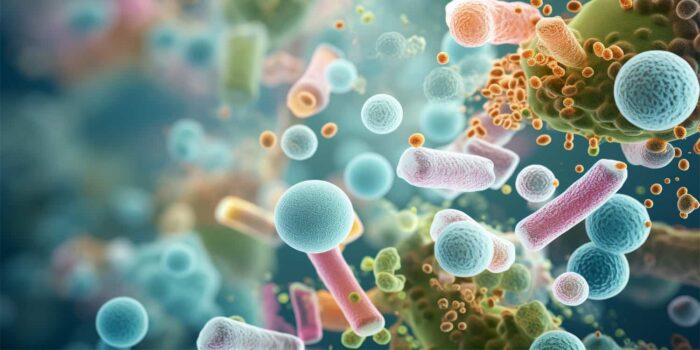A brand new examine of rats with disrupted intestine microbiota discovered that train mitigated the unfavorable results of this disruption on the capability of the hippocampus area of the mind to provide new neurons. This protected them from cognitive impairments noticed in rats with disrupted intestine microbiota who led a sedentary life-style. The analysis was revealed in Translational Psychiatry.
Human mind cells – neurons – usually cease dividing shortly after delivery. After this preliminary interval, the mind continues to bear modifications by means of creating new hyperlinks between neurons, however there may be usually no creation of latest neurons. There are, nevertheless, some exceptions.
The hippocampus, a area of the mind concerned in reminiscence formation and spatial navigation, retains the power to generate new neurons. That is referred to as grownup hippocampal neurogenesis. Research recommend that hippocampal grownup neurogenesis might play a key function in studying, reminiscence processes, and temper regulation.
Latest research point out that this means of the hippocampus to create new neurons can also be influenced by intestine microbiota – the trillions of microorganisms dwelling within the intestine. This affect is achieved by means of the microbiota-gut-brain axis, a bidirectional pathway that enables intestine microbiota to affect processes within the mind and vice versa.
Research writer Sarah Nicolas and her colleagues be aware that earlier research have indicated that train enhances cognitive efficiency in rats. Earlier analysis additionally confirmed that train can improve grownup hippocampal neurogenesis in rats, i.e., enhance the power of their hippocampus areas to create new neurons. These researchers needed to look at whether or not train may also ameliorate the potential unfavorable results the disruption of intestine microbiota has on hippocampal neurogenesis.
They carried out a sequence of experiments on 9-week previous Sprague-Dawley rats, a pressure of rats usually utilized in scientific analysis. Rats had been saved in a 12h-12h light-dark cycle i.e., with lights turned on throughout one half of a day and turned off throughout the different. They’d free entry to meals and water.
The researchers randomly divided the rats into two teams: a sedentary group and an train group. Every of those two teams was additional subdivided into two subgroups: a gaggle that might bear antibiotic remedy (to destroy/disrupt their intestine microbiota) and a gaggle that might not.
The rats present process the antibiotic remedy acquired consuming water that contained dissolved antibiotics. The train group was housed in cages with free entry to a working wheel, whereas the sedentary group lived in customary cages with out working wheels. Researchers monitored the variety of working wheel revolutions to make sure that the train group was partaking in bodily exercise as supposed.
Three weeks after these remedies began, the rats accomplished numerous behavioral exams to evaluate their cognitive talents. After this, researchers euthanized the rats and analyzed their tissue to evaluate hippocampal neurogenesis.
The outcomes confirmed that disruption of the intestine microbiota utilizing antibiotics didn’t change the rats’ physique weight nor their working exercise. Nonetheless, it did induce low-grade peripheral irritation. The metabolism of the hippocampus was not affected by the disruption in intestine microbiota.
Nonetheless, rats with disrupted microbiota who additionally led a sedentary life-style carried out worse on behavioral exams designed to evaluate cognitive efficiency and exhibited extra anxiety-like behaviors in comparison with rats with intact intestine microbiota. Train mitigated these hostile modifications, as they weren’t current in rats with disrupted microbiota who exercised.
Intestine microbiota disruption diminished hippocampal neurogenesis, however this impact was attenuated within the group that exercised. By analyzing particular biochemical compounds related to these modifications, the researchers recognized the extent of expression of ethyl 2-(4-oxo-4,5-dihydro-1,3-thiazol-2-yl) acetate as being related to many of the noticed modifications.
“We noticed that train partially reversed behavioral and neurogenic modifications induced by intestine microbiota disruption and that these impairments occurred with out important modifications within the hippocampal metabolome [a set of compounds indicative of the metabolic activity of the hippocampus), despite drastic shifts in the caecal metabolome [the metabolites present in the caecum, a pouch-like structure at the junction of the small and large intestines].”
“Taken collectively, these knowledge spotlight the significance of the intestine microbiota in AHN-dependent behaviors [behaviors that depend on adult hippocampal neurogenesis] and display the ability of life-style elements comparable to voluntary train to attenuate these modifications,” the examine authors concluded.
The examine sheds mild on the results of train on preserving grownup hippocampal neurogenesis. Nonetheless, this examine was carried out on rats. Though rats and people share many physiological similarities, they’re nonetheless very completely different species. The results on people won’t be equivalent.
The paper, “Exercise mitigates a gut microbiota-mediated reduction in adult hippocampal neurogenesis and associated behaviours in rats,” was authored by Sarah Nicolas, Sebastian Dohm-Hansen, Aonghus Lavelle, Thomaz F. S. Bastiaanssen, Jane A. English, John F. Cryan, and Yvonne M. Nolan.





